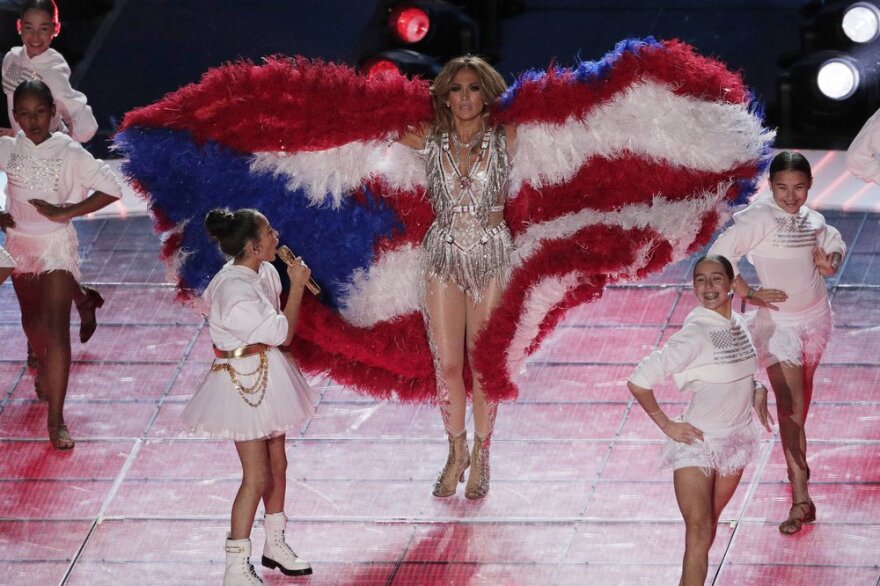COMMENTARY
In 2001, there was no bigger fan of Colombian megastar Shakira than my 12-year-old Venezuelan niece Andrea. That summer she was here in Miami when my boss asked me to interview Shakira. So I took Andrea along to meet her idol. (I figured it’d cinch me at least one relative who’d visit me in a nursing home someday.)
Afterward Andrea announced, “I want to be Shakira when I grow up.”
“I thought you wanted to be a doctor.”

“No. Shakira.”
I gently but dutifully reminded her: “I love Shakira’s music too. But what Shakira does isn’t as important as what a doctor does.”
READ MORE: America Won't Solve Immigration by Loathing Latin Americans. Ask the Irish
Andrea today is a doctor. A damn good one. And I of course thought of her during Shakira’s blockbuster Super Bowl halftime show with Jennifer Lopez on Sunday night. But I’ve been thinking about her even more in its euphoric aftermath – when every scribe in North America is declaring the two women the greatest Latino heroes since the late Mexican-American civil rights leader Cesar Chavez or Puerto Rican U.S. Supreme Court Justice Sonia Sotomayor.
Shakira and J.Lo’s performance was hands down a fabulous, inspiring rush. As the husband of a Latina and the father of Latino children, I took large satisfaction in its “let’s-get-loud” assertion of Latino culture and pride – and its sly, potent jabs at anti-brown bigotry in the Trump era. But precisely because I have close and loving ties to el mundo Latino, I worry Latinos and non-Latinos alike are assuming that a Super Bowl extravaganza is all you need to neutralize that bigotry – and its very real policy effects.

So I’d gently but dutifully remind the scribes: what Shakira and J.Lo do isn’t as important as what Chavez did and Sotomayor does.
I’m not trying to be a gringo buzzkill here. I understand the influence entertainment platforms like music, sports and film can have on public affairs. If not, I wouldn’t have written one of the first English-language magazine cover stories on Shakira, Julieta Venegas and Latin America’s other pioneering rockeras back in 1998. The cross-over stakes – the potential for their female Latin rock to impact not just music but the larger Latino presence – were big.
But that cultural impact is just one, limited means to Latino empowerment. Not the end. Which is why I felt so uneasy this week reading assertions that the twerking halftime holler was a historic “watershed” for Latinos that proved their “growing power.” It seems we’ve decided Shakira’s joyous tongue zaghrouta was enough to silence Trump’s demonization of America’s largest minority group.
The twerking Super Bowl extravaganza was a fabulous showcase of Latino pride, but it wasn't the watershed showcase of Latino power too many commentators declared it – as Trump's State of the Union address reminded us.
If Tuesday’s State of the Union address was any indication, it isn’t. The zaghrouta may have even compelled President Trump to double down on his scapegoating of undocumented immigrants – and by dog-whistle association, Latinos – as invasive ogres stealing American jobs and murdering American citizens.
So the question isn’t whether Shakira and J.Lo subdued that. They didn’t. (Nor did another recent Latino cultural happening, the backlash against Jeanine Cummins’ immigrant novel “American Dirt.”) The real question is whether their sensual Miami fireworks might help energize the kind of political leadership and civic enthusiasm – like waking up Latino voter turnout – that actually can subdue it.
TANTALIZING GLIMPSE
J.Lo is justifiably a Puerto Rican icon. But aside from Sotomayor (who as a judge has narrower leadership leeway) can the average American point to one Puerto Rican leader today whose name recognition even approaches J.Lo’s? Former Housing and Urban Development Secretary Julián Castro did offer the tantalizing glimpse of a prime-time standard-bearer for Mexican-Americans, the U.S.’s largest Latino cohort. But last month he had to drop out as the only Latino in the Democratic presidential race because, he said, “It simply isn’t our time.”

Excuse me, it isn’t Latinos’ time? It’s not “time” for the fastest-growing demographic in the U.S.? That’s why a little cold water needs to be thrown on the adulation for Shakira and J.Lo’s caliente spectacle. Not because it wasn’t amazing – but because its messianic reviews could use a tad bit of perspective.
Perspective that was apparent the morning after the State of the Union speech, when CNN asked Mexican-American Congresswoman Veronica Escobar of Texas about offering taxpayer-funded healthcare to undocumented immigrants. Trump had slammed the idea; but Escobar had no detailed, persuasive response – just well-worn anti-Trump talking points.
It made you wonder if Castro isn’t right. Someday leaders like him and Escobar will be as ready for the national political stage as Shakira was for the Super Bowl halftime stage. And that will be the watershed moment for Latinos.


